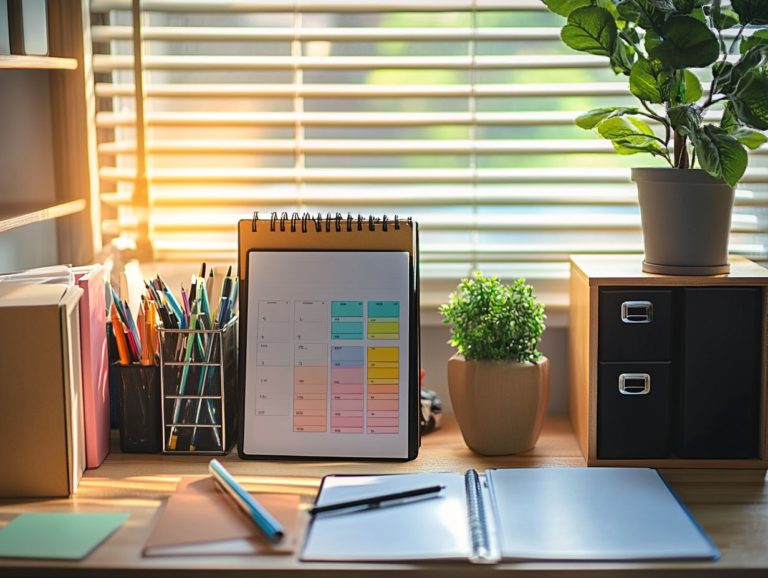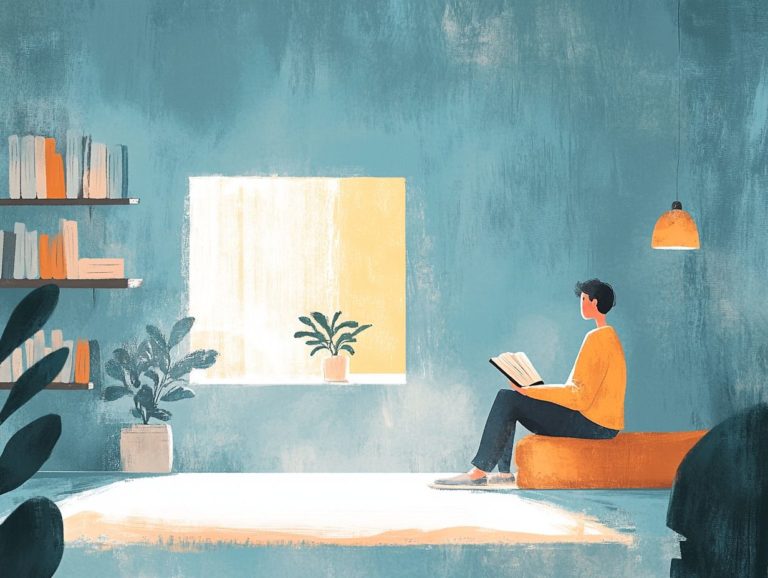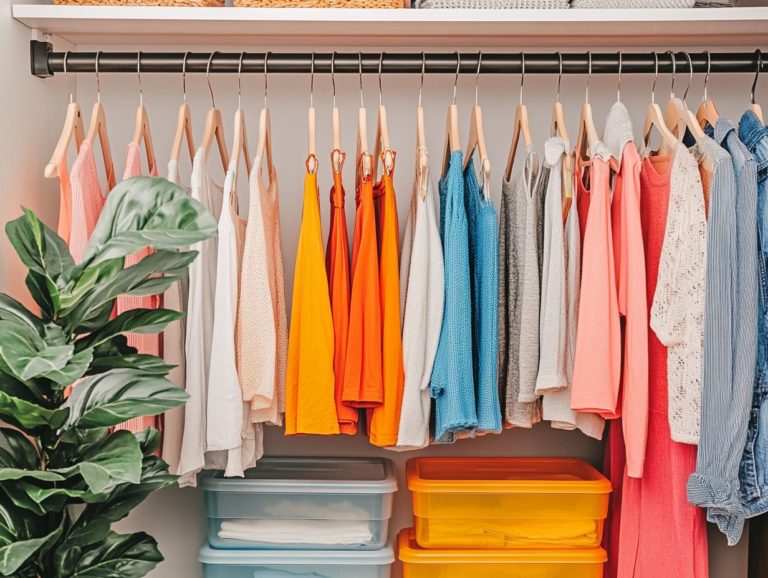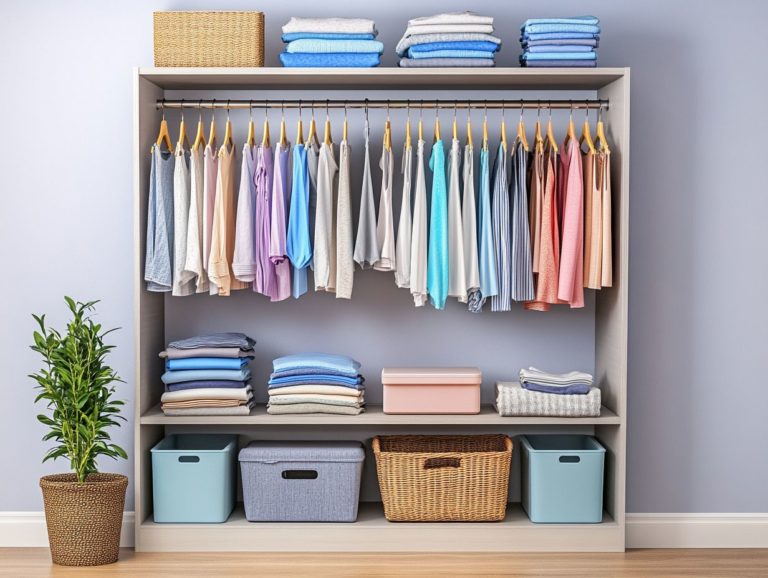Decluttering Your Closet: Tips for Hoarders
Hoarding can feel overwhelming, not just for you but also for those who care about you.
Understanding the psychological roots of hoarding is crucial for effective decluttering. This article delves into the significance of creating a clean, organized space and provides you with practical strategies to begin your journey.
From setting achievable goals to maintaining a clutter-free closet, you ll find tips that simplify decision-making. If necessary, we ll also touch on when it might be time to seek professional support.
Together, let s embark on the transformation of your space!
Contents
Key Takeaways:
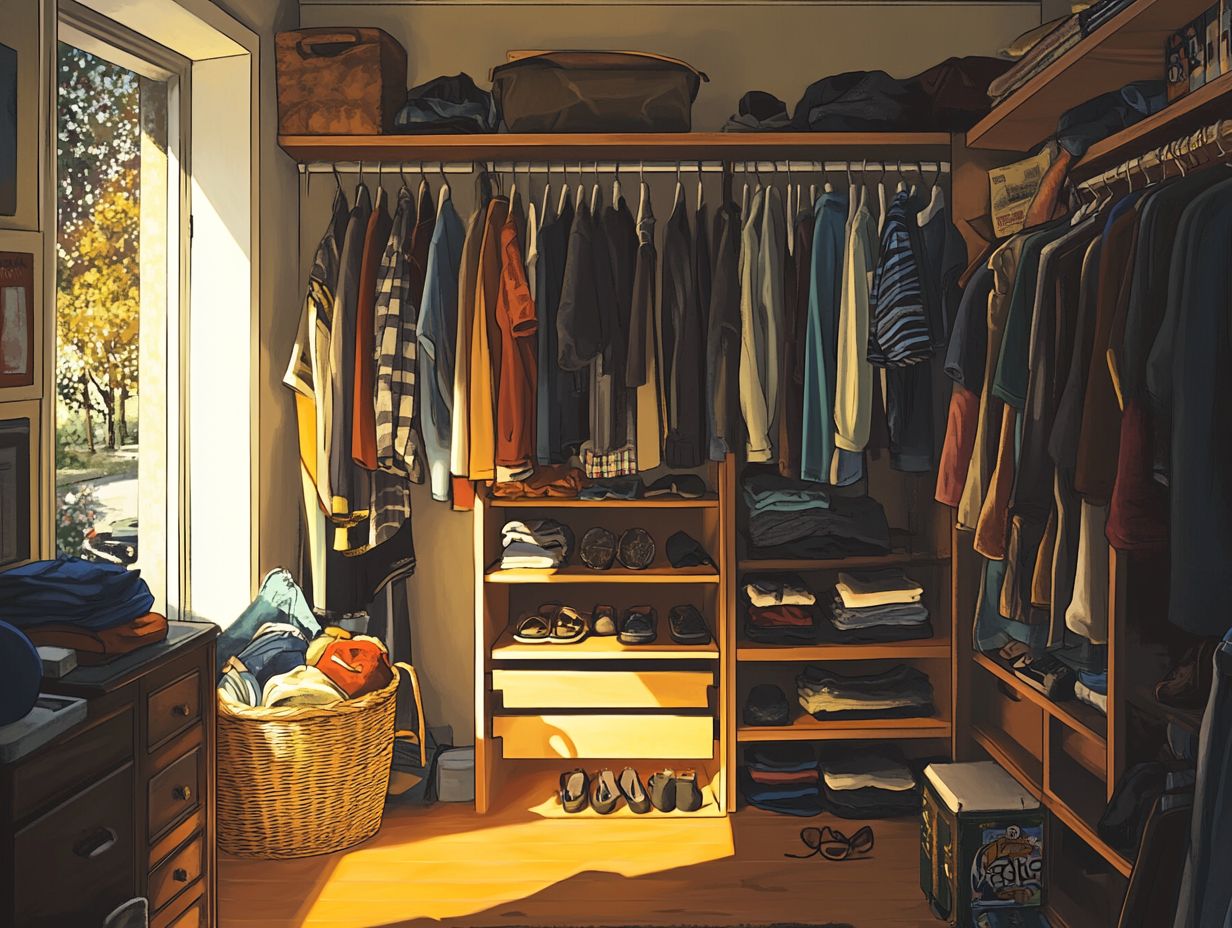
- Understanding the root causes of hoarding is crucial in addressing the issue and finding effective solutions.
- Decluttering can have a positive impact on hoarders’ mental well-being and physical living space, leading to a better quality of life.
- Creating a plan, setting achievable goals, and utilizing decision-making strategies are key steps in successfully decluttering a hoarder’s closet.
The Psychology of Hoarding
Understanding the psychology of hoarding invites you to delve into the intricate feelings and mental health problems that may compel individuals to accumulate excessive items, leading to clutter that can dominate their living spaces. This complex behavior often springs from anxiety, a fear of loss, or a deep attachment to sentimental possessions.
Experts like Gail Steketee and Carrie Ypma emphasize the importance of a nuanced approach to effectively address these psychological challenges. By acknowledging these underlying factors, you can better appreciate the multifaceted nature of hoarding and the support needed for those affected.
Understanding the Root Causes
The root causes of hoarding often tie back to complex emotional and psychological factors. These can manifest as anxiety and result in significant clutter in your living space.
These underlying issues may originate from past trauma, where you ve come to associate emotional safety with the accumulation of items. For many, early childhood experiences play a crucial role in shaping one s relationship with possessions. Feelings of instability or loss can create a profound need to hold onto objects.
This emotional attachment can morph into an overwhelming compulsion to retain even seemingly insignificant items. It complicates your ability to maintain a tidy environment and leads to increased mental strain. Anxiety disorders can further intensify these tendencies, intertwining your perception of value with your mental health struggles, ultimately establishing a challenging cycle that can be difficult to break.
Why Decluttering is Important for Hoarders
Decluttering is essential for you if you find yourself hoarding. It not only allows you to reclaim valuable physical space but also alleviates emotional burdens, greatly enhancing your mental health and overall well-being.
By systematically reducing clutter, you can cultivate an organized living environment that fosters peace of mind and emotional clarity. This change will empower you, promoting a healthier lifestyle and allowing you to thrive in your surroundings.
The Benefits of a Clean and Organized Space
A clean and organized space provides a wealth of benefits, especially for those grappling with hoarding. It can significantly enhance your mental health and emotional well-being.
For many, embracing order in their surroundings leads to reduced anxiety levels, as clutter often acts as an ever-present source of stress. One person recounted how, after decluttering, they felt a noticeable uplift in their mood, allowing them to engage more meaningfully with family and friends.
Improved focus is another crucial advantage; when distractions are minimized, your concentration can soar, ultimately boosting productivity. Numerous case studies indicate that individuals who commit to maintaining an organized living area experience an enhanced quality of life, frequently reporting greater satisfaction and a sense of accomplishment.
In the end, the process of decluttering can transform not just your physical space but also your emotional landscape, cultivating a profound sense of peace and control.
Now is the time to take action and change your space!
Getting Started with Decluttering

Getting started with decluttering requires a strategic plan and clearly defined goals to minimize clutter effectively.
This will transform your living space into an organized haven.
By approaching decluttering with intention, you can tackle your collection of clothing systematically.
Make thoughtful decisions about what to keep, donate, or discard.
A mindful approach creates a peaceful home you’ll love.
Creating a Plan and Setting Goals
Create a decluttering plan and set achievable goals to manage clutter effectively.
Set specific, measurable, attainable, relevant, and time-bound (SMART) goals to guide your decluttering.
Identify the areas in your home that cause the most stress due to clutter.
Prioritize these spaces based on frequency of use and visibility.
This approach keeps your motivation high and helps you see your progress.
For instance, aim to declutter a specific room each weekend.
Incorporate small rewards after each task to elevate your motivation.
Make the journey towards a serene, clutter-free space enjoyable and sustainable.
Tips for Sorting and Letting Go
Effective sorting and letting go of items are important to decluttering.
This process helps you make thoughtful choices about what to keep and what to donate or discard.
Utilize strategic decision-making techniques to navigate emotional hurdles when parting with sentimental belongings.
This approach leads to a more organized and fulfilling space.
Strategies for Decision Making
Implement effective strategies for decision-making during the sorting process.
Carefully evaluate each possession to uncover its true value in your life.
Ask yourself questions about the item’s utility: Does it serve a practical purpose in your daily routine?
Consider the emotional significance of your belongings.
Reflect on memories attached to them and whether those moments bring you joy.
A photograph or a treasured gift may deserve a special place, while outdated clothing might hold less value.
This thoughtful approach simplifies sorting and adds a layer of meaning to your decisions.
Maintaining a Clutter-Free Closet
Maintaining a clutter-free closet is an ongoing journey.
Establish effective organizational systems and consistent habits to keep clutter at bay.
Start using sustainable practices today to enjoy the benefits of an organized space!
Organizational Systems and Habits
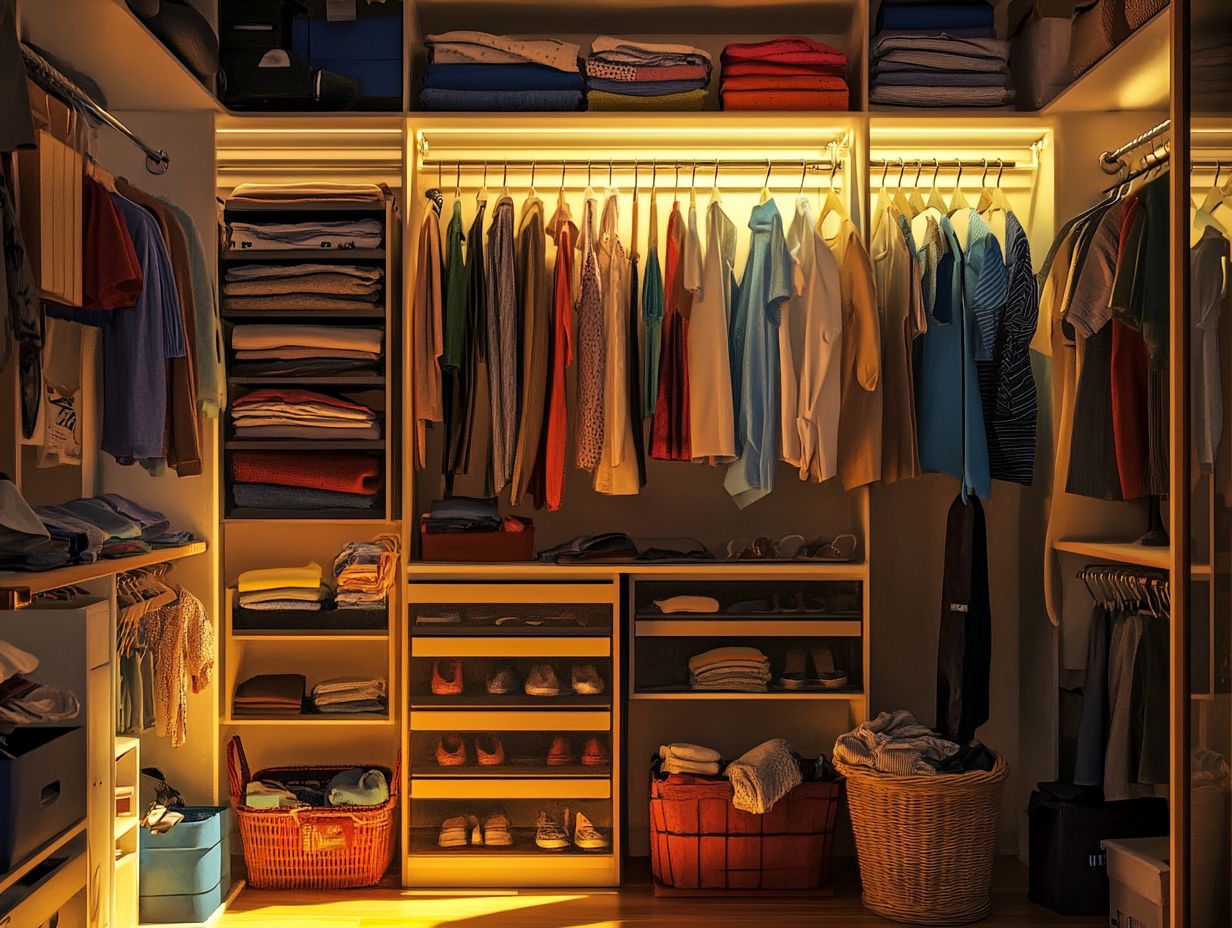
Establishing effective organizational systems is crucial for a clutter-free closet.
Categorize your clothing styles:
- Casual wear
- Formal attire
This allows you to quickly locate what you need and make the most of your wardrobe.
Implement seasonal storage solutions, like:
- Under-bed bins for off-season garments
- Vacuum-sealed bags for bulky winter wear
Cultivate positive habits, like regularly decluttering and donating items you no longer wear.
Create a routine for swapping out seasonal items to refresh your wardrobe.
This prevents overcrowding and makes the selection process enjoyable and effortless.
Start today and take the first step towards a serene space!
Seeking Professional Help
Seeking professional help can truly be a transformative step for anyone grappling with hoarding. It offers essential emotional support and guidance needed to navigate these challenges effectively.
By connecting with therapists or counselors who specialize in hoarding behaviors, you can acquire valuable tools and strategies to tackle the underlying psychological issues. This journey paves the way for a healthier relationship with your belongings, allowing you to reclaim your space and peace of mind. Additionally, learning how to declutter before building a capsule wardrobe can further support your efforts in simplifying your life.
When to Consider Therapy or Counseling
Recognizing when to seek therapy or counseling is crucial for your journey in navigating the complexities of hoarding and emotional distress. For many, the choice to reach out for professional assistance often arises from deep-seated feelings of anxiety that seem insurmountable or from an overwhelming struggle to declutter their living space, which often leads to distress and shame that can feel overwhelming.
If you find yourself experiencing social isolation, you might notice a tendency to retreat further into hoarding behaviors, exacerbating the challenges you face. Being attuned to these indicators is crucial, as they frequently signal that it’s time to consider therapeutic options that can help you manage your clutter. Exploring the benefits of a decluttered closet could also provide valuable insights and motivation.
Therapies like Cognitive Behavioral Therapy (CBT), a type of therapy that helps change negative thought patterns, and Exposure Therapy, which helps people gradually face their fears, have proven effective in addressing hoarding behaviors and improving mental health. Additionally, understanding when to know it’s time to declutter your closet can also play a significant role in enhancing overall well-being.
These approaches can help you uncover the emotional triggers behind your attachments and cultivate healthier coping mechanisms, guiding you toward a more balanced and fulfilling life while making it easier to maintain your clothes collection.
Frequently Asked Questions
What is hoarding?
Hoarding is a psychological disorder characterized by persistent difficulty in discarding or parting with possessions, regardless of their actual value.
How does hoarding affect my closet?

Clothing hoarders tend to accumulate excessive amounts of belongings, which can quickly clutter up a closet and make it difficult to find or access clothes.
What are some signs that I may be a hoarder?
Some signs of hoarding include a strong attachment to possessions, difficulty in letting go of items, and excessive clutter in living spaces, particularly in your clothes closet.
What are some tips for decluttering my closet as a hoarder?
Begin with small tasks, like tackling one shelf at a time. Sort items into categories and make decisions based on their usefulness and value. Get support from friends or family together, you can make this easier!
How can I prevent myself from hoarding again in the future?
Adopt a “one in, one out” rule where you only purchase or acquire new clothes after getting rid of something else. Make it a habit to tidy up your closet regularly to avoid the accumulation of excess items and to maintain a clean space, especially during spring cleaning and fall cleaning.
Where can I seek help for my hoarding tendencies?
You can seek help from a therapist or counselor who specializes in clothes hoarding disorder. There are also support groups and resources available to help individuals cope with and overcome hoarding tendencies, including expert insights from professionals like Gail Steketee and organizations such as the International Obsessive Compulsive Disorder Foundation.

